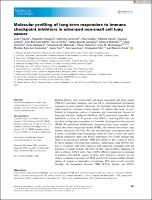| dc.contributor | Vall d'Hebron Barcelona Hospital Campus |
| dc.contributor.author | Navarro Mendivil, Alejandro |
| dc.contributor.author | Callejo Perez, Ana |
| dc.contributor.author | Iranzo Gómez, Patricia |
| dc.contributor.author | Cedres Perez, Susana |
| dc.contributor.author | Martínez Marti, Alexandre |
| dc.contributor.author | Pardo Aranda, Nuria |
| dc.contributor.author | Jiménez Flores, José Antonio |
| dc.contributor.author | Sansano Valero, Irene |
| dc.contributor.author | Mancuso, Francesco Mattia |
| dc.contributor.author | Nuciforo, Paolo Giovanni |
| dc.contributor.author | Vivancos Prellezo, Ana |
| dc.contributor.author | Felip Font, Enriqueta |
| dc.contributor.author | Amat, Ramon |
| dc.contributor.author | Saoudi Gonzalez, Nadia |
| dc.contributor.author | Carbonell, Caterina |
| dc.contributor.author | Frigola Rissech, Joan |
| dc.date.accessioned | 2021-12-01T13:17:30Z |
| dc.date.available | 2021-12-01T13:17:30Z |
| dc.date.issued | 2021-04 |
| dc.identifier.citation | Frigola J, Navarro A, Carbonell C, Callejo A, Iranzo P, Cedrés S, et al. Molecular profiling of long‐term responders to immune checkpoint inhibitors in advanced non‐small cell lung cancer. Mol Oncol. 2021 Apr;15(4):887–900. |
| dc.identifier.issn | 1574-7891 |
| dc.identifier.uri | https://hdl.handle.net/11351/6634 |
| dc.description | Chromosomal alterations burden; Imune checkpoint inhibitors; Tumor mutational burden |
| dc.description.abstract | Immunotherapy has transformed advanced non-small cell lung cancer (NSCLC) treatment strategies and has led to unprecedented long-lasting responses in some patients. However, the molecular determinants driving these long-term responses remain elusive. To address this issue, we performed an integrative analysis of genomic and transcriptomic features of long-term immune checkpoint inhibitors (ICIs)-associated responders. We assembled a cohort of 47 patients with NSCLC receiving ICIs that was enriched in long-term responders [>18 months of progression-free survival (PFS)]. We performed whole-exome sequencing from tumor samples, estimated the tumor mutational burden (TMB), and inferred the somatic copy number alterations (SCNAs). We also obtained gene transcription data for a subset of patients using Nanostring, which we used to assess the tumor immune infiltration status and PD-L1 expression. Our results indicate that there is an association between TMB and benefit to ICIs, which is driven by those patients with long-term response. Additionally, high SCNAs burden is associated with poor response and negatively correlates with the presence of several immune cell types (B cells, natural killers, regulatory T cells or effector CD8 T cells). Also, CD274 (PD-L1) expression is increased in patients with benefit, mainly in those with long-term response. In our cohort, combined assessment of TMB and SCNAs burden enabled identification of long-term responders (considering PFS and overall survival). Notably, the association between TMB, SCNAs burden, and PD-L1 expression with the outcomes of ICIs treatment was validated in two public datasets of ICI-treated patients with NSCLC. Thus, our data indicate that TMB is associated with long-term benefit following ICIs treatment in NSCLC and that TMB, SCNAs burden, and PD-L1 are complementary determinants of response to ICIs. |
| dc.language.iso | eng |
| dc.publisher | Wiley |
| dc.relation.ispartofseries | Molecular Oncology;15(4) |
| dc.rights | Attribution 4.0 International |
| dc.rights.uri | http://creativecommons.org/licenses/by/4.0/ |
| dc.source | Scientia |
| dc.subject | Pulmons - Càncer - Tractament |
| dc.subject | Medicaments antineoplàstics - Ús terapèutic |
| dc.subject | Pulmons - Càncer - Prognosi |
| dc.subject.mesh | Carcinoma, Non-Small-Cell Lung |
| dc.subject.mesh | Progression-Free Survival |
| dc.subject.mesh | Antineoplastic Agents |
| dc.subject.mesh | /therapeutic use |
| dc.title | Molecular profiling of long-term responders to immune checkpoint inhibitors in advanced non-small cell lung cancer |
| dc.type | info:eu-repo/semantics/article |
| dc.identifier.doi | 10.1002/1878-0261.12891 |
| dc.subject.decs | carcinoma de pulmón de células no pequeñas |
| dc.subject.decs | supervivencia libre de progresión |
| dc.subject.decs | antineoplásicos |
| dc.subject.decs | /uso terapéutico |
| dc.relation.publishversion | https://doi.org/10.1002/1878-0261.12891 |
| dc.type.version | info:eu-repo/semantics/publishedVersion |
| dc.audience | Professionals |
| dc.contributor.organismes | Institut Català de la Salut |
| dc.contributor.authoraffiliation | [Frigola J, Carbonell C, Amat R] Thoracic Cancers Translational Genomics Unit, Vall d’Hebron Institute of Oncology (VHIO), Barcelona, Spain. [Navarro A, Callejo A, Iranzo P, Cedrés S, Martinez-Marti A, Pardo N, Saoudi-Gonzalez N] Servei d’Oncologia Mèdica, Vall d’Hebron Hospital Universitari, Barcelona, Spain. Vall d’Hebron Institute of Oncology (VHIO), Barcelona, Spain. [Jimenez J, Nuciforo P] Molecular Oncology Group, Vall d’Hebron Institute of Oncology (VHIO), Barcelona, Spain. [Sansano I] Unitat de Patologia, Vall d’Hebron Hospital Universitari, Barcelona, Spain. [Mancuso FM, Vivancos A] Cancer Genomics Laboratory, Vall d’Hebron Institute of Oncology (VHIO), Barcelona, Spain. [Felip E] Thoracic Cancers Translational Genomics Unit, Vall d’Hebron Institute of Oncology (VHIO), Barcelona, Spain. Servei d’Oncologia Mèdica, Vall d’Hebron Hospital Universitari, Barcelona, Spain. Vall d’Hebron Institute of Oncology (VHIO), Barcelona, Spain |
| dc.identifier.pmid | 33342055 |
| dc.identifier.wos | 000605076800001 |
| dc.relation.projectid | info:eu-repo/grantAgreement/ES/PE2013-2016/PI17%2F00938 |
| dc.rights.accessrights | info:eu-repo/semantics/openAccess |

